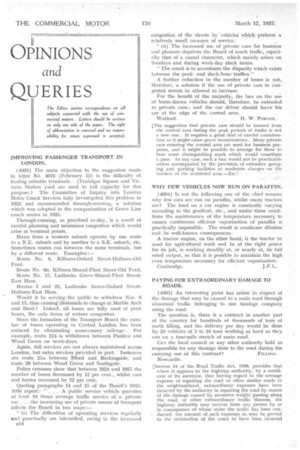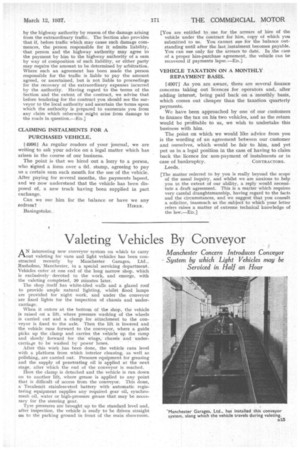OPINIONS
Page 48

Page 49

If you've noticed an error in this article please click here to report it so we can fix it.
and
QUERIES
IMPROVING PASSENGER TRANSPORT IN LONDON.
1.4993] The main objection to the suggestion made in letter No. 4976 (February 12) is the difficulty of finding suitable terminals. (Trafalgar Square and Victoria Station yard are Used to full capacity for this purpose.) The Committee of Inquiry into London .Motoe. Coach Services fully investigated this problem in 1932 and recommended through-running, a solution which was adopted in the reorganization of Green Line coach routes in 1933 Through-running, as practised to-day, is a result of careful planning and minimizes congestion which would arise at terminal points.
Buses from a western suburb operate by one route to a N.E. suburb and by another to a S.E. suburb, etc. Sometimes routes run between the same terminals, but by a different route. Examples:— Route No. 8, Kilburn-Oxford Street-Holborn-Old Ford.
Route No, 60, Kilburn-Strand-Fleet Street-Old Ford. Route No. 15, Ladbroke Grove-Strand-Fleet StreetEast Ham.
Routes 7 and 23, Ladbroke Grove-Oxford StreetHolborn-East Harin.
Would it be serving the public to withdraw Nos. 8 and 15, thus causing thousands to change at Marble Arch and Bank? Indeed, all buses are fully used at peak hours, the only times of serious congestion.
Since the formation of the Transport Board the number of buses operating in Central London has been reduced by eliminating unnecessary mileage. For example, route 124 is withdrawn betweert Pimlico and Wood Green on week-days. .
Again, full services are not always maintained across London, but extra services provided in part. Instances are route 25a between 111Ord and Barkingside, and route 29 between Wood Green and Southgate.
Police censuses show that .between 1924 and 1935 the number of buses decreased by 12 per cent., whilst cars and lorries increased by 72 per cent,
Quoting paragraphs 14 and 15 of the Board's 193511130 report: " . . . A public service vehicle provides at least 10 times average traffic service of a private car . . . the increasing use of private means of transport affects the Board in two ways:— " (i) The difficulties of operating services regularly and punctually are intensified, owing to the increased 1314 congestion of the streets by vehicleS which perform a relatively small measure of service.
" (ii) The 'increased use of private cars for business and pleasure deprives the Board of much traffic, especially that of a casual character, which mainly arises on Sundays and during week-day slack hours.
" The result is to accentuate the disparity which exists between the peakand slack-hour traffics."
A further reduction in the number of buses is not, therefore, a solution if the use of private cars in con: gested streets be allowed to increase.
For the benefit of the majority, the ban on the use of horse-drawn vehicles should, therefore, be extended to private cars; and the car driver should leave his car at the edge of the central area.
Watford. H. W. PORTER.
The suggestion that private cars Should be banned from the central area during the peak periods of traffic is not a new one. It requires a great deal of careful consideration as it might cause grave inconvenience. Many private cars entering the central area are used for business purposes, and it might be possible to arrange for these to hear some distinguishing .mark which would constitute a pass. In any case, such a ban would not be practicable unless accompanied by the provision of extensive garaging and parking facilities at moderate charges on the borders of the restricted area:—En.9 '
WHY FEW VEHICLES NOW RUN ON PARAFFIN.
(4994) Is not the following_ one of the chief reasons why few cars are run on paraffin, whilst many tractors are? The load on a car engine is constantly varying according to the gradient, etc., and under these conditions the maintenance of the temperature necessary to ensure continuous efficient vaporization of paraffin is practically impossible. The result is crankcase dilution and its well-known consequences.
A tractor engine, on the other hand, if the tractor be used for agricultural Work and be of the right power for its job, is working steadily at, or nearly at, its full rated output, so that it is possible to maintain the high even temperature necessary for efficient vaporization.
Cambridge. J.F.L.
PAYING FOR EXTRAORDINARY DAMAGE TO ROADS.
[4995] An interesting point has arisen in respect of the damage that may be caused to a main road through abnormal traffic belonging to one haulage company using the road.
The question is, there is a contract in another part of the country for hundreds of thousands of tons of earth filling, and the delivery per day would be done by 20 vehicles of 5 to 10 tons working as hard as they can on a four-mile stretch of main road.
Can the local council or any other authority hold us responsible for any damage done to the road during the carrying out of this contract? FILLING. Newcastle.
[Section 54 of the Road Traffic Act, 1930, provides that where it appears to the highway authority, by a certificats of its surveyor, that having regard to the average expense of repairing the road or other similar roads in the neighbourhood, extraordinary expenses have been incurred by the authority in repairing the road by reason of the damage caused by excessive weight passing along the road, or other extraordinary traffic thereon, the highway authority may recover from any person by or in consequence of whose order the traffic has been conducted, the amount of such expenses as, may be proved to the satisfaction of the court to have been incurred by the highway authority by reason of the damage arising from the extraordinary traffic. The Section also provides that if, before traffic which may cause such damage commences, the person responsible for it admits liability, that person and the highway authority may agree to the payment by him to the highway authority of a sum by way of composition of such liability, or either party may require the amount to be determined by arbitration. Where such an agreement has been made the person responsible for the traffic is liable to pay the amount agreed, or ascertained, but is not liable to proceedings for the recovery of the extraordinary expenses incurred by the authority. Having regard to the terms of the Section and the extent of the contract, we advise that before tendering for the Contract you should see the surveyor to the local authority and ascertain the terms upon which the authority is prepared to exonerate you from any claim which otherwise might arise from damage to the roads in question.—.En.]
CLAIMING INSTALMENTS FOR A PURCHASED VEHICLE.
[4996] As regular readers of your journal, we are writing to ask your advice on a legal matter which has arisen in the course of our business.
The point is that we hired out a lorry to a person, who signed a form over a 6d. stamp, agreeing to pay us a certain sum each month for the use of the vehicle. After paying for several months, the payments lapsed, and we now understand that the vehicle has been disposed of, a new truck having been supplied in part exchange.
Can we sue him for the balance or have we any redress? HIRER. Basingstoke. You are entitled to sue for the arrears of hire of the vehicle under the contract for hire, copy of which you submitted to us. You cannot sue for the balance outstanding until after the last instalment becomes payable. You can sue only for the arrears to date. In the case of a proper hire-purchase agreement, the vehicle can be recovered if payments lapse.—ED.}
VEHICLE TAXATION ON A MONTHLY .REPAYMENT BASIS.
[4997] As you are aware, there are several finance concerns taking out licences for operators and, after adding interest, being paid back on a monthly basis, which comes out cheaper than the taxation quarterly payments.
We have been approached by one of our customers to finance the tax on his two vehicles, and as the return would be profitable to us, we wish to undertake this business with him.
The point on which we would like advice from you is the wording of an agreement between our customer and ourselves, which would be fair to him, and yet put us in a legal position in the case of having to claim back the licence for non-payment of instalments or in
case of bankruptcy. CONTRACTORS. Leeds.
[The matter referred to by you is really beyond -the scope of the usual inquiry, and whilst we are anxious to help you to the extent of our ability, a reply would necessitate a draft agreement. This is a matter which requires very careful draughtsmanship, having regard to the facts and the circumstances, and we suggest that you consult a solicitor, inasmuch as the subject to which your letter refers raises a matter of extreme technical knowledge of the law.—ED.]




















































































